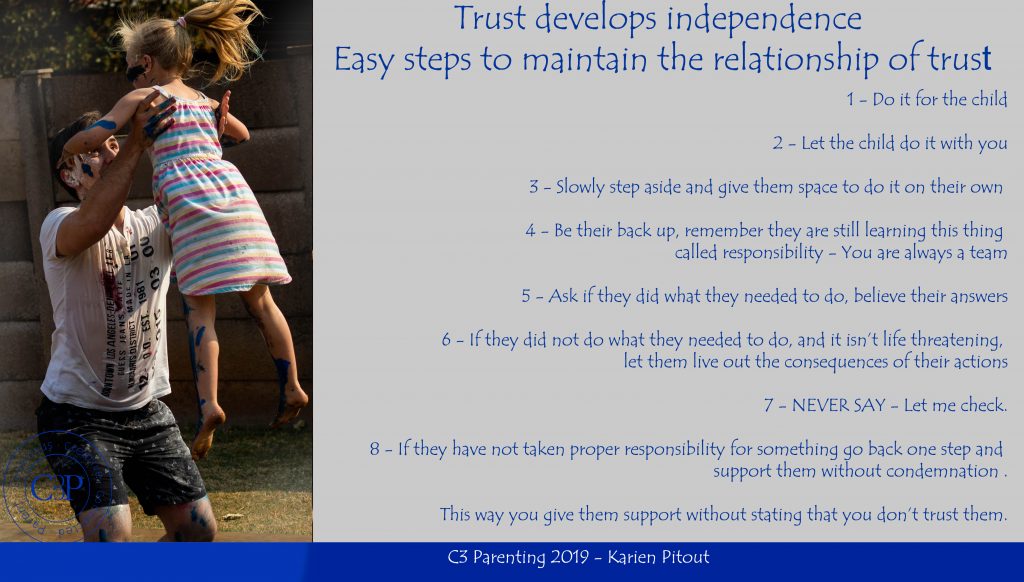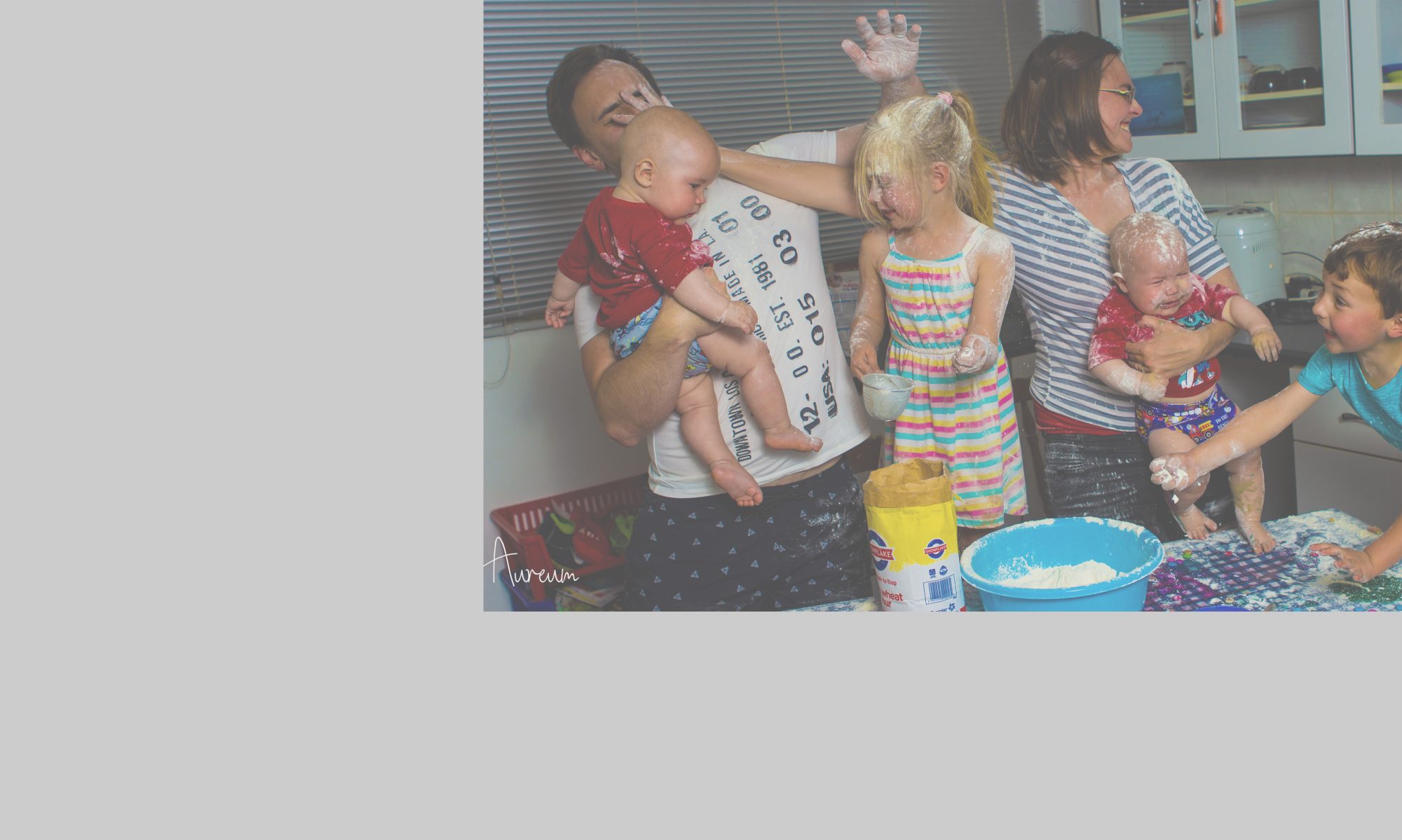One of the more difficult concepts when raising children is the concept of trusting our children. It doesn’t really come easy, does it? We’ve had to do everything for our children from infancy, we had to trust our own judgement and we all know how under developed a child’s ability to think rationally is. We have all done the “Have you brushed your teeth? Come here let me check” mantra. We have to do it, because they are still learning, easily distracted and some kids just really hate doing certain tasks, like brushing teeth. So we as parents have to check them.

The problem is, that our children start with a deficit of trust from parents, at least that is how they experience and view it. We do not take them at their word from the get go. I am fully aware that there is the belief that trust is earned and not just given, and we want our children to earn our trust. Well what if today we challenged that belief? What if from today you give trust to your child from the get go? No, I am not saying don’t check up on things as they learn how to do certain tasks, what I am saying is, always give them the benefit of trust until proven otherwise.
“Oh, but that is not how life works.” I hear you say. However it is how life works in reality. Think about it in these adult terms: You are looking for a job. You send your CV to a company. The person who reads your CV has to trust that what you wrote on your CV is in fact correct. For them to actually want to do a check on your qualifications and experience, they first had to trust the information you gave them. They do the checks – well some do, some don’t, you never know – if you were truthful, the checks will confirm their trust in the information you gave them is correct. Now you finally earned some more trust. However it started with you trusting that they will look at your CV and them trusting the information given. That small step of trust sets the foundation to earn further trust.
Trust is usually shown in the small things we do. If we feel the need to check up on our children to see if they followed through on something then either we thrust responsibility upon them before they were ready, or, we have unresolved trust issues of our own. Yes, I said it!
The last mentioned, heralds the need for deep introspection, it goes to how you were raised. Did your parents patiently show through how they treated you that they trust you or was your childhood littered with phrases like, “Let me check” or “Ï trust you, but not your friends or the outside world”. The problem with these phrases, as innocent as they may seem, is it always reflects back to the idea that you are not trustworthy and the mistakes you have made count against you. “Let me check” says: I do not take you by your word, you have let me down before, so why should I believe you now? I don’t trust your ability to be honest, thorough or capable. I know, when they are young, they experiment with lies and boundaries, and it never stops until the day we die. I also know they need support while spreading their wings, developing their independence and decision making skills. Starting from the foundation of trust, it is easier to guide them and help them manage the journey.
“I trust you, but…” the ‘but’ nullifies the trust and the belief that you are trusted. If you don’t trust my friends, then you don’t trust my ability to make valuable friends and build positive relationships. If you don’t trust the world, then you don’t trust that I will be able to care for myself in this world. That means you feel I cannot be trusted to make good choices when you are not around. This typically happens in the teenage years. Yes, I know, we don’t really trust the world or that weird friend our kid brought home. Our child’s ability to make good choices is not fully developed yet, so of course the trust is difficult.
They are our kids and we mean well. We want to set them up for success. How do we encourage independence, honesty and good decision making, if we do not set up boundaries and check up on them?
Trust, like connection works with a bank account. When baby is born, we don’t need to earn their trust. They trust implicitly that we will meet their needs. They trust us to listen to them and protect them and love them. We trust them too, to let us know when they need something, whether by cooing, looking at us, making small gestures or even crying. The relationship starts with trust.
In infancy our relationship with our children either deposits trust into the account or withdraws trust from the trust account. Every time baby signals their need and we respond, it deposits not just connection but trust into the bank. When we miss a cue, we withdraw from both accounts. In infancy, a healthy relationship between parent and child creates a positive relational bank account in connection and trust.
After infancy, we withdraw often from this bank account. When baby starts to walk and explore, but instead of trusting them to be able to learn how to trust their own body, we keep telling them how to do it. We keep on stepping in and thereby interfering in the learning curve. The more we helicopter their movements – I am not saying let them tumble down head first down a flight of stairs – the more we create a deficit in the bank of trust. There is a difference between standing close by and waiting to catch them when they fall, and providing supportive commentary like “I see your hands need a place to hold onto” and holding on to their bodies as they try to manage climbing down the stairs. In the first scenario, we trust that they will find a safe way to climb the stairs, while we show them they can trust us to catch them if they stumble or fall. But with the second scenario we hinder them learning to trust their own bodies and skills. Do they fall and get hurt, yes they do, however allowing them to fall and get hurt their brain learns how their bodies feel when off balance. They learn to trust themselves.
At certain ages we hand over specific reigns of responsibility to our children. We stop brushing their teeth and they start doing it themselves. We stop feeding them and they start feeding themselves. There is still a learning curve involved here. Yes, you have been brushing your child’s teeth for 2 years, we would hope they have learned by now how to do it properly. They did not! They learn through doing. For the next two to three years, brush teeth side by side, prompting the next place or step in the routine. Eventually, you will brush side by side and you will see them brushing every tooth the way they learned how to. Now you can slowly extract yourself from their tooth brushing process. You remind them that it is time to brush teeth and send them off to do so. How do you know if they did it? Initially you can walk with them to the bathroom and see them off at the sink. Over time, you see them off at the door and finally you reach the point where you don’t walk with them. It is a gradual process and you can follow your child’s lead, they will show you and tell you to let them be, when they are ready. Never ask them to show you if they brushed their teeth. You will soon enough discover if they did not. That goodbye hug or kiss will tell you if they did not. Don’t scold them when you smell the stinky breath. Just hug and whisper, “I can smell your teeth are not brushed, quickly go and do it please.” and leave it there. If there is no time or the situation does not allow for going back and brushing, when they are younger than 8, have some breath freshener with you, just to help them out until there is time to brush teeth. If they are older, natural consequences is the way to go.
Brushing teeth is just a small example of how to maintain and build on the trust relationship. We need to apply this to all things they do, learn and have a responsibility for.
Steps for checking whilst keeping the trust relationship in the positive:
1 – Do it for the child
2 – Let the child do it with you
3 – Slowly step aside and give them space to do it on their own
4 – Be their back up, remember they are still learning this thing called responsibility – You are always a team
5 – Ask if they did what they needed to do, believe their answers
6 – If they did not do what they needed to do, and it isn’t life threatening, let them live out the consequences of their actions
7 – NEVER SAY – Let me check.
8 – If they have not taken proper responsibility for something go back one step and support them without condemnation i.e. let’s brush our teeth together today. That way you give them support without stating that you don’t trust them.
There is no incentive for a child to be honest if we constantly check up on them after they have stated that they have completed a task. There is only incentive for honesty if they get positive reinforcement and support when they make mistakes. Protecting our children from the consequences of their choices and actions while they are still learning responsibility, teaches them nothing. Punishing them for not doing what they said they did, will just increase the likelihood that they will rather do it behind our backs and develop better skills at being sneaky.
You can have a conversation about honesty and trust with your child. Have these conversations when you are calm and not angry. You can say things like “I am feeling disappointed that you did not brush your teeth like you said you did. Honesty and trust is important for us to be able to function as a family. I want to be able to trust you. So let us find a solution together to get your teeth brushed in the morning.”
This invites your child into a conversation and it will be a clear indicator of whether you have thrust a responsibility onto your child, before they were ready to bear it. Remember, each child is different and even though there are all these guidelines of at what age a child ‘should’ be able to take proper responsibility for a task, not every child will be ready at that age and your child is not failing if they need support for a little bit longer than others.
C3 Parenting believes in setting parents and children up for success. We offer parenting courses and workshops. Click here to find out more
Like and follow us on Facebook Click here
13,553 total views, 2 views today

